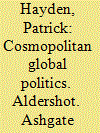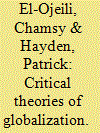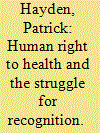| Srl | Item |
| 1 |
ID:
062240


|
|
|
|
|
| Publication |
Aldershot, Ashgate Publishers, 2005.
|
| Description |
174p.
|
| Series |
Ethics and global politics
|
| Standard Number |
9780754642763
|
|
|
|
|
|
|
|
|
|
|
|
Copies: C:1/I:0,R:0,Q:0
Circulation
| Accession# | Call# | Current Location | Status | Policy | Location |
| 049689 | 172.4/HAY 049689 | Main | On Shelf | General | |
|
|
|
|
| 2 |
ID:
075186


|
|
|
|
|
| Publication |
Hampshire, Palgrave Macmillan, 2006.
|
| Description |
v, 241p.
|
| Standard Number |
1403986398
|
|
|
|
|
|
|
|
|
|
|
|
Copies: C:1/I:0,R:0,Q:0
Circulation
| Accession# | Call# | Current Location | Status | Policy | Location |
| 051986 | 303.482/OJE 051986 | Main | On Shelf | General | |
|
|
|
|
| 3 |
ID:
113299


|
|
|
|
|
| Publication |
2012.
|
| Summary/Abstract |
Persistent health inequalities exist globally, affecting high-income countries and blighting the developing world. Health inequalities currently are one of the greatest challenges facing realisation of the human right to health. This article argues that the struggle for the right to health in the face of such inequalities requires embracing three critical considerations: redistribution, representation, and recognition. While the analysis of the right to health has been formulated predominantly around theories of distributive justice, I suggest that a more normatively compelling account will link the politics of economic redistribution to the politics of sociocultural recognition. A recognition approach, which views rights claims as grounded on the vulnerability of the human condition, can show how rights are emergent in political action and that the ability to claim and exercise the human right to health is contingent upon recognition of diverse sociopolitical statuses. From this perspective, there are no 'neutral' constructions of the rights-bearing subject and conflict between different political framings of the right to health is a consequence of the struggle for recognition. This theme is illustrated by comparing conservative, affirmative, and transformative processes of recognition in the struggle for access to essential antiretroviral medicines by South Africa's Treatment Action Campaign.
|
|
|
|
|
|
|
|
|
|
|
|
|
|
|
|